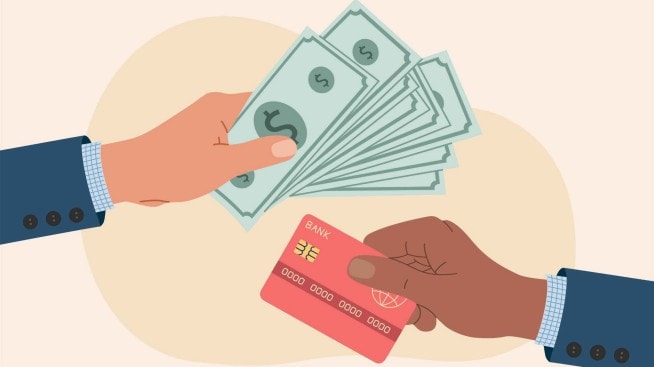What is debt management?

Quick insights
- Debt management is one way to potentially help with tackling credit card debt.
- Debt management can be self-managed or facilitated by a credit counselor or debt relief program.
- It is possible that your credit score could be impacted by actions taken in the debt management process (like closing credit card accounts).
If you've found yourself in credit card debt, you're not alone.
Falling into debt is undoubtedly stressful—it feels like you're carrying around a weight, heavy with worry about whether or not you can pay the next bill. Dealing with your own financial burden can distract you from living your regular day-to-day life.
Debt management is the process of assessing your debt and alleviating some of it with financial budgeting and planning.
Finding a way to address your debt isn't easy, but it's important to manage it because you could spiral into further debt or other complicated situations if it's not addressed early. For example, if you've missed a credit card payment, you could be faced with additional expenses like late fees or higher annual percentage rates (APRs). Let's walk through some of the ways to help alleviate the heaviness that comes with having debt.
In this article, we will cover:
- What debt management is
- Debt settlement vs. debt management
- If debt management hurts your credit score
- Creating a plan to help manage your debt
What is a debt management plan?
One avenue you may take to manage your debt is by setting up a debt management plan (DMP), which is a way to repay your debts through a credit counseling company (more on this later). Debt management can be done either on your own or through a credit counselor or debt relief program. Let's explore some options for how you can get a jumpstart on your debt below.
Do it Yourself debt management
While it may be a major undertaking, managing debt on your own is not impossible. If you're looking to find ways to navigate your financial situation on your own (and perhaps set yourself up for better habits in the future), you can start mapping out your financial situation.
You could start by listing your outstanding balances and closely reviewing your budget. You can review your balances with Chase Credit Journey®, a free online tool available to everyone. There you may see your credit score and how paying down your debts can help improve it.
Assistance from a credit counselor or debt management company
You don't have to face these financial burdens alone. A credit counselor is a professional who has experience understanding finances and budgeting. As experts in credit, they can help you figure out your financial situation, provide budgeting tips and personalize a plan for you. They may take you through the process of understanding finances step by step and help set you up for future success.
Make sure that if you decide to work with a credit counselor you work with a reputable organization.
Debt management plans
DMPs offer consumers a way to help navigate their debt. They are usually offered by credit counseling or nonprofit companies that will help you with your financial situation. They come with negotiations about monthly payments, waiving fees and getting you a lower interest rate. Ideally, with a DMP, you may be able to repay your debt in about 5 years, but plans and goals can always change depending on your situation.
Keep in mind the DMPs are usually offered for unsecured accounts, such as those without collateral (like unsecured credit card accounts). You may need to close these accounts in order to set up your repayment plan.
As you can see, there are pros and cons to DMPs—you may be able to repay your accounts which could help you avoid further damage to your credit score. On the other hand, you may face other fees or have to close credit card accounts as part of your action plan.
Debt settlement vs. debt management
Now that we have a better idea of what debt management is, you may be wondering if this is the same thing as debt settlement. While these phrases sound similar to each other, there are some key differences between debt settlement and debt management. Let's break down these terms in greater detail below.
Debt settlement
If you're facing serious debt and looking for additional assistance, a debt settlement company may be used to help you negotiate lower monthly payments. Keep in mind that while this may help lower your costs in the short-term, you may face long-term consequences such as impacting your credit score due to the fact that you aren't paying your balances off in full. When this happens, you're affecting your payment history, a major component that gets factored into calculating your credit score.
Debt management
Whether you set up a plan on your own or a DMP through a nonprofit company or credit counselor, debt management is aimed at paying off your debts in full. You may want to get professional advice on how to address your budget and create a plan of action.
Debt management requires honing in on skills to better manage your money and budget, enabling you to pay off your debt over time. You may want to consider enrolling in Chase Credit Journey to help map out your financial goals.
Does debt management affect your credit score?
It's possible for your credit score to be impacted by a debt management plan at first due to certain actions such as closing credit card accounts. This action may affect your credit history and mix as well as your total available credit limit thus impacting your credit utilization ratio. However, don't worry—this might be a temporary dip that can eventually improve over time due to the fact that you're regaining traction on your finances.
Creating a plan to manage your debt
If you're thinking about tackling your debt and finding a way to alleviate some of the stress and burden, there are few ways to set up a plan. You could consider reaching out to a credit counselor or a nonprofit debt management company who can sit with you and help you learn how your finances work, what actions to take and other helpful advice. When looking for professional assistance, make sure you consider the following:
- Are you working with a company that has a long history with a good reputation?
- Is this company/credit counselor someone who has experience in their field?
- Are the costs/fees reasonable for the services they offer?
If you're setting up a plan by yourself, you may want to ask yourself the following questions to help understand how you want to manage your debt:
- What kinds of debt do you owe and how much is that in total?
- Which debts would be cost-effective and helpful for you to pay off first?
- How much money are you spending on expenditures (items that are not necessities)?
Bottom line
No matter how much debt you are in or what your financial situation is, managing money in an already complicated world can make your palms sweat and your heart race. Take a deep breath—you can do this! Taking proactive steps—whether that's creating a debt management plan with a credit counselor or developing one yourself—can help empower you to start making financially healthier decisions and set yourself up for a better financial future.



